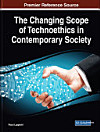Handbook of Research on Technoethics
About this ebook
The Handbook of Research on Technoethics traces the emergence of the new interdisciplinary field of technoethics by exploring its conceptual development, important issues, and key areas of current research. Compiling 50 authoritative articles from leading researchers on the ethical dimensions of new technologies, this comprehensive handbook is an invaluable addition to library reference collections and will provide a wealth of insights to academics, students, and practitioners in a variety of fields affected by technology and its ethical implications.
Ratings and reviews
- Flag inappropriate
About the author
Rebecca Adell, PhD, is the former Coordinator of the Academic Writing Help Centre at the University of Ottawa, Canada, and currently works as the Business Manager of Eck MacNeely Architects in Boston, Massachusetts. Her dissertation on the history of smoke pollution regulation in nineteenth-century England was rooted in science and technology studies, with particular focus on the connections between technological advance, evolving perceptions of pollution, and the response of government and the courts to the new technological realities of the Industrial Revolution. [Editor]






